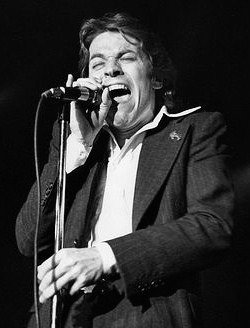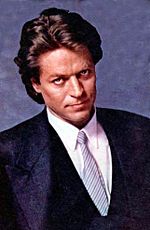Robert Palmer (singer) facts for kids
Quick facts for kids
Robert Palmer
|
|
|---|---|

Palmer in 1976
|
|
| Background information | |
| Birth name | Robert Allen Palmer |
| Born | 19 January 1949 Batley, West Riding of Yorkshire, England |
| Died | 26 September 2003 (aged 54) Paris, France |
| Genres | |
| Occupation(s) |
|
| Years active | 1964–2003 |
| Labels | |
Robert Allen Palmer (born January 19, 1949 – died September 26, 2003) was a famous English singer and songwriter. He was known for his strong, soulful voice. Robert Palmer loved to explore different music styles. He mixed soul, funk, jazz, rock, pop, reggae, and blues in his songs.
Robert Palmer's career lasted for four decades. He is best known for his rock-soul song, "Addicted to Love". The music video for this song became very famous. It showed the exciting style of the 1980s.
He started in music in the 1960s, even playing with a band called Vinegar Joe. He became very successful in the 1980s. This was true for his solo songs and with his band, the Power Station. Many of his songs were Top 10 hits in the UK and the US.
Robert Palmer won several awards. These included two Grammy Awards for Best Male Rock Vocal Performance. He also won an MTV Video Music Award. He passed away at age 54 from a heart attack.
Contents
Robert Palmer's Music Journey
Starting in Music: Early Bands (1964–1973)
Robert Palmer was born in 1949 in Batley, England. When he was a baby, his family moved to Malta. His father worked there for the British navy. As a child, Robert listened to blues, soul, and jazz music. He heard these styles on American radio. His parents' music tastes also influenced him. His family moved back to the UK when he was 12.
As a teenager, Palmer moved to Scarborough. He joined his first band, the Mandrakes, at 15. He was still in high school then. The next year, he left school. He briefly studied art before working at a newspaper.
In 1969, Robert got his first big chance. He was asked to sing for the band the Alan Bown Set. He recorded vocals for their single "Gypsy Girl." He later re-recorded vocals for their album The Alan Bown!.
In 1970, he joined a jazz-rock band called Dada. This band included singer Elkie Brooks. After one year, Palmer, Brooks, and Pete Gage formed Vinegar Joe. Robert played guitar and shared lead vocals with Elkie. They signed with Island Records. Vinegar Joe released three albums before breaking up in 1974.
Solo Career Begins (1974–1978)
Island Records signed Robert Palmer as a solo artist in 1974. His first solo album was Sneakin' Sally Through the Alley. He recorded it in New Orleans. The album was inspired by the music of Little Feat and the Meters. The Meters even played as his backing band. The album was not a big hit in the UK. However, it reached the top 100 in the US.
After moving to New York City, Palmer released Pressure Drop in 1975. This album included a cover of a reggae song by Toots and the Maytals. He toured with Little Feat to promote this album.
His next album, Some People Can Do What They Like, did not do well. So, Palmer decided to move to Nassau, Bahamas. He lived right across from Compass Point Studios.
In 1978, he released Double Fun. This album had rock songs with a Caribbean feel. It included a cover of "You Really Got Me". The album reached the top 50 in the US. His song "Every Kinda People" became a top 20 single. This song has been covered by many other artists.
Growing Success (1979–1984)
Palmer's album Secrets (1979) focused on pure rock music. It gave him another top 20 hit, "Bad Case of Loving You (Doctor, Doctor)". This song reached number 14.
In 1980, he released Clues. This album had hits on both sides of the Atlantic. These included "Johnny and Mary" and "Looking for Clues". The music videos for these songs were catchy. They helped him reach a younger audience. He had more success with the 1982 EP Some Guys Have All the Luck.
As the 1980s continued, Palmer became more successful. He also started producing music for other artists. He helped with Jamaican artist Desmond Dekker's 1981 album. He also helped John Martyn with his album Sapphire.
In April 1983, he released Pride. This album included the song "You Are in My System". On May 31, 1983, Palmer's concert in London was recorded for BBC Radio. On July 23, 1983, he played at a charity concert. There, he became friends with members of Duran Duran. This led to the formation of the supergroup the Power Station.
The Power Station and MTV Fame (1985–1989)
When Duran Duran took a break, two of their members, Andy Taylor and John Taylor, joined Robert Palmer. They also teamed up with former Chic drummer Tony Thompson. Together, they formed the Power Station. Their first album, The Power Station, was a big hit. It reached the top 20 in the UK and top 10 in the US.
The album had two hit singles: "Some Like It Hot" and a cover of the T. Rex song "Get It On (Bang a Gong)". Robert Palmer performed live with the band only once. He decided to leave the band's tour to focus on his solo career.
Riptide and EMI Records
Robert Palmer recorded his album Riptide in 1985. Tony Thompson and Andy Taylor played on some tracks. The album featured the song "Addicted to Love". This song became number 1 in the US and number 5 in the UK.
The music video for "Addicted to Love" was very famous. It showed Palmer singing with female models pretending to play instruments. This video was directed by Terence Donovan. Donovan also directed videos for "Simply Irresistible" and "I Didn't Mean to Turn You On." In 1987, Palmer won a Grammy Award for Best Male Rock Vocal Performance for "Addicted to Love."
Another song from Riptide, "I Didn't Mean to Turn You On", was also a hit. It reached number 2 in the US and number 9 in the UK.
In 1987, Palmer moved to Lugano, Switzerland. He set up his own recording studio there. In 1988, he released Heavy Nova. This album mixed bossa nova rhythms with rock and soul. The video for "Simply Irresistible" was similar to "Addicted to Love." This song reached number 2 in the US. The ballad "She Makes My Day" was a hit in the UK. In 1989, he won another Grammy Award for Best Male Rock Vocal Performance for "Simply Irresistible."
Continued Success in the 1990s
Palmer continued to explore different music styles with his album Don't Explain (1990). It included two UK top 10 hits. These were covers of Bob Dylan's "I'll Be Your Baby Tonight" (with UB40) and Marvin Gaye's "Mercy Mercy Me".
In the 1990s, Palmer tried even more diverse music. His 1992 album Ridin' High was a tribute to older music styles.
In 1994, Palmer released Honey. This album had mixed reviews. It did not produce any big hits in the US. However, he had some success in the UK with songs like "Girl U Want" and "You Blow Me Away".
In 1995, a greatest hits album was released. It reached number 4 in the UK. Also in 1995, he reunited with members of The Power Station. They recorded a second album called Living in Fear (1996). They had just started touring when the bassist, Bernard Edwards, passed away.
In 1997, Robert Palmer performed with Rod Stewart at Wembley.
Robert Palmer's Life
Robert Palmer met his future wife, Sue, in 1969. They got married two years later and had two children. The family moved to New York City in the mid-1970s. A few years later, they moved to the Bahamas. In 1987, Palmer and his family moved to Lugano, Switzerland. Robert and Sue divorced in 1993.
Robert Palmer was a private person. He was not interested in the wild parts of the rock 'n' roll lifestyle. However, he was a very heavy smoker. He smoked up to 60 cigarettes a day. Even though he lived away from Yorkshire for many years, he said the region taught him a strong work ethic.
His Passing
Robert Palmer passed away from a heart attack in a Paris hotel room. This happened on September 26, 2003, when he was 54 years old. He had been in Paris after filming a TV show in London. His long-time partner, Mary Ambrose, was not with him.
Many people shared their sadness, including Duran Duran. They said, "He was a very dear friend and a great artist. This is a tragic loss to the British music industry." Robert Palmer was buried in Lugano, Switzerland.
Awards and Nominations
| Award | Year | Nominee(s) | Category | Result | Ref. |
|---|---|---|---|---|---|
| ASCAP Pop Music Awards | 1986 | "Addicted to Love" | Most Performed Songs | Won | |
| 1990 | "Simply Irresistible" | Won | |||
| Grammy Awards | 1980 | "Bad Case of Loving You" | Best Rock Vocal Performance, Male | Nominated | |
| 1987 | "Addicted to Love" | Song of the Year | Nominated | ||
| Record of the Year | Nominated | ||||
| Best Rock Vocal Performance, Male | Won | ||||
| 1989 | "Simply Irresistible" | Won | |||
| MTV Video Music Awards | 1986 | "Addicted to Love" | Video of the Year | Nominated | |
| Best Male Video | Won | ||||
| Best Stage Performance in a Video | Nominated | ||||
| Best Overall Performance | Nominated | ||||
| Viewer's Choice | Nominated | ||||
| 1987 | "I Didn't Mean to Turn You On" | Best Male Video | Nominated | ||
| Pollstar Concert Industry Awards | 1987 | Tour | Small Hall Tour of the Year | Won |
Robert Palmer's Albums
Studio albums
- Sneakin' Sally Through the Alley (1974)
- Pressure Drop (1975)
- Some People Can Do What They Like (1976)
- Double Fun (1978)
- Secrets (1979)
- Clues (1980)
- Maybe It's Live (1982) (Half studio tracks, half live)
- Pride (1983)
- Riptide (1985)
- Heavy Nova (1988)
- Don't Explain (1990)
- Ridin' High (1992)
- Honey (1994)
- Rhythm & Blues (1999)
- Drive (2003)
Images for kids
See also
 In Spanish: Robert Palmer para niños
In Spanish: Robert Palmer para niños
 | Audre Lorde |
 | John Berry Meachum |
 | Ferdinand Lee Barnett |




